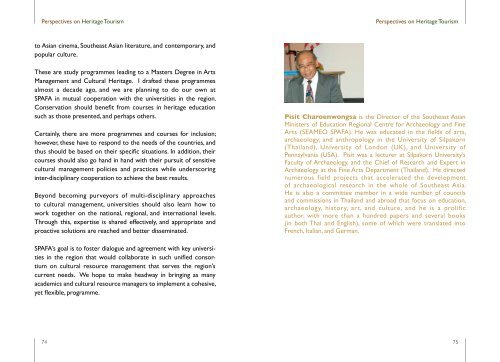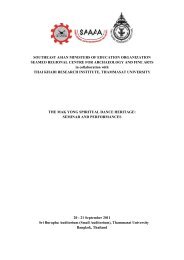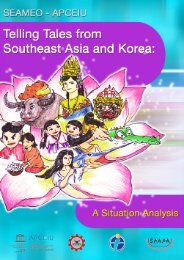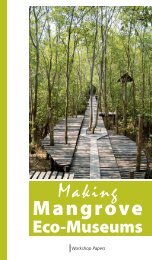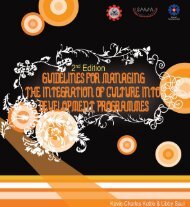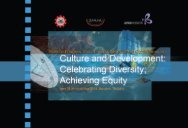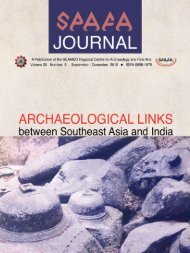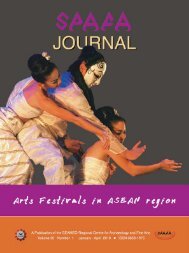Perspectives on Heritage Tourism - Seameo-SPAFA
Perspectives on Heritage Tourism - Seameo-SPAFA
Perspectives on Heritage Tourism - Seameo-SPAFA
You also want an ePaper? Increase the reach of your titles
YUMPU automatically turns print PDFs into web optimized ePapers that Google loves.
<str<strong>on</strong>g>Perspectives</str<strong>on</strong>g> <strong>on</strong> <strong>Heritage</strong> <strong>Tourism</strong><br />
<str<strong>on</strong>g>Perspectives</str<strong>on</strong>g> <strong>on</strong> <strong>Heritage</strong> <strong>Tourism</strong><br />
to Asian cinema, Southeast Asian literature, and c<strong>on</strong>temporary, and<br />
popular culture.<br />
These are study programmes leading to a Masters Degree in Arts<br />
Management and Cultural <strong>Heritage</strong>. I drafted these programmes<br />
almost a decade ago, and we are planning to do our own at<br />
<strong>SPAFA</strong> in mutual cooperati<strong>on</strong> with the universities in the regi<strong>on</strong>.<br />
C<strong>on</strong>servati<strong>on</strong> should benefit from courses in heritage educati<strong>on</strong><br />
such as those presented, and perhaps others.<br />
Certainly, there are more programmes and courses for inclusi<strong>on</strong>;<br />
however, these have to resp<strong>on</strong>d to the needs of the countries, and<br />
thus should be based <strong>on</strong> their specific situati<strong>on</strong>s. In additi<strong>on</strong>, their<br />
courses should also go hand in hand with their pursuit of sensitive<br />
cultural management policies and practices while underscoring<br />
inter-disciplinary cooperati<strong>on</strong> to achieve the best results.<br />
Bey<strong>on</strong>d becoming purveyors of multi-disciplinary approaches<br />
to cultural management, universities should also learn how to<br />
work together <strong>on</strong> the nati<strong>on</strong>al, regi<strong>on</strong>al, and internati<strong>on</strong>al levels.<br />
Through this, expertise is shared effectively, and appropriate and<br />
proactive soluti<strong>on</strong>s are reached and better disseminated.<br />
Pisit Charoenw<strong>on</strong>gsa is the Director of the Southeast Asian<br />
Ministers of Educati<strong>on</strong> Regi<strong>on</strong>al Centre for Archaeology and Fine<br />
Arts (SEAMEO <strong>SPAFA</strong>). He was educated in the fields of arts,<br />
archaeology, and anthropology in the University of Silpakorn<br />
(Thailand), University of L<strong>on</strong>d<strong>on</strong> (UK), and University of<br />
Pennsylvania (USA). Pisit was a lecturer at Silpakorn University’s<br />
Faculty of Archaeology, and the Chief of Research and Expert in<br />
Archaeology at the Fine Arts Department (Thailand). He directed<br />
numerous field projects that accelerated the development<br />
of archaeological research in the whole of Southeast Asia.<br />
He is also a committee member in a wide number of councils<br />
and commissi<strong>on</strong>s in Thailand and abroad that focus <strong>on</strong> educati<strong>on</strong>,<br />
archaeology, history, art, and culture, and he is a prolific<br />
author, with more than a hundred papers and several books<br />
(in both Thai and English), some of which were translated into<br />
French, Italian, and German.<br />
<strong>SPAFA</strong>’s goal is to foster dialogue and agreement with key universities<br />
in the regi<strong>on</strong> that would collaborate in such unified c<strong>on</strong>sortium<br />
<strong>on</strong> cultural resource management that serves the regi<strong>on</strong>’s<br />
current needs. We hope to make headway in bringing as many<br />
academics and cultural resource managers to implement a cohesive,<br />
yet flexible, programme.<br />
74<br />
75


